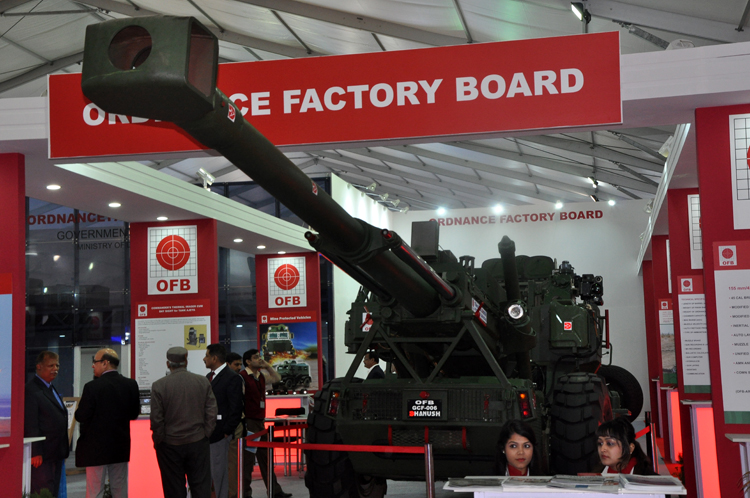INDIAN ARMED FORCES CHIEFS ON OUR RELENTLESS AND FOCUSED PUBLISHING EFFORTS

The insightful articles, inspiring narrations and analytical perspectives presented by the Editorial Team, establish an alluring connect with the reader. My compliments and best wishes to SP Guide Publications.

"Over the past 60 years, the growth of SP Guide Publications has mirrored the rising stature of Indian Navy. Its well-researched and informative magazines on Defence and Aerospace sector have served to shape an educated opinion of our military personnel, policy makers and the public alike. I wish SP's Publication team continued success, fair winds and following seas in all future endeavour!"

Since, its inception in 1964, SP Guide Publications has consistently demonstrated commitment to high-quality journalism in the aerospace and defence sectors, earning a well-deserved reputation as Asia's largest media house in this domain. I wish SP Guide Publications continued success in its pursuit of excellence.
- MoD initiates comprehensive review of Defence Acquisition Procedure 2020, pushes for defence reforms
- G7: The Swansong
- Kalinga Connect: South Asia to Polynesia
- Must Credit DRDO for Operation Sindoor, now what is next for defence R&D?
- The layered Air Defence systems that worked superbly, the key element of Operation Sindoor
- Operation Sindoor | Day 2 DGMOs Briefing
- Operation Sindoor: Resolute yet Restrained
India firm on corporatising Government-owned arms factories
41 Ordnance Factories set to be recast as Defence PSUs amidst clarification that corporatisation need not mean privatisation

In a rare and stunning public rebuke of the culture of unprofessionalism and entitlement which characterises India's Government-managed Defence Production complex, the Ministry of Defence on August 21 detailed the rationale behind the move to corporatize its 41 Ordnance Factories which supply a range of military equipment from tanks and armoured vehicles to artillery guns and assault rifles to the armed forces.
The stinging indictment singed the Ordnance Factories, which are facing industrial unrest following the corporatisation move. These factories are managed by an Ordnance Factory Board (OFB), which functions as an attached office of the Department of Defence Production. The very strong and categorical statement is also a clear indication that the Government is firm on converting the OFB into a public sector corporate entity with relative autonomy and accountability.
A public statement issued by the Ministry of Defence lambasted its Ordnance Factories for "performance issues" and "lack(ing) professional attitude". A monopolistic culture and orders on a nomination basis have leave zero incentive to improve quality. The statement specifically lists "poor quality", "high costs", "lack of innovation" and "low productivity" as the drivers for the decision to reorganise the OFB. "There is no penalty for delayed delivery," bemoaned the Ministry of Defence
A public statement issued by the Ministry of Defence lambasted its Ordnance Factories for "performance issues" and "lack(ing) professional attitude". A monopolistic culture and orders on a nomination basis have leave zero incentive to improve quality. The statement specifically lists "poor quality", "high costs", "lack of innovation" and "low productivity" as the drivers for the decision to reorganise the OFB. "There is no penalty for delayed delivery," bemoaned the Ministry of Defence.
"The present structure of OFB is inconsistent with the requirement of production centre which calls for lot of flexibility at managerial and functional level," the statement adds, observing that this structure is a hindrance for market-driven decisions like modernisation of plant and machinery, entering into joint ventures and Transfer of Technology agreements and the ability to compete with the private sector.
There is no incentive to make profits to sustain business operations autonomously because as a Government department, OFB cannot retain profits.
While the Government does not intend throwing the Ordnance Factories into the deep end of the market immediately, the signal is that these should function on business lines and not depend solely on Government orders for survival. It does not want the OFB complex to be a cost centre for the Government anymore, and move away from cost plus mechanism to competitive pricing
The statement cited multiple reports suggesting OFB corporatisation including those of the TKA Nair Committee (Year 2000), Dr Vijay Kelkar Committee (2004) and the Raman Puri Committee (2015). While the Nair and Kelkar Committees suggested all Ordnance Factories be corporatised under one single entity under the leadership of competitive management, the Puri Committee recommended splitting of this complex into three of four segments.
"Corporation does not necessarily mean privatisation," the Ministry of Defence stated, addressing the concerns of protesting OFB employees but not entirely ruling out privatisation. It explained the decision to reorganise in terms of functional autonomy needed to operate in a competitive business environment and introducing accountability.
While the Government does not intend throwing the Ordnance Factories into the deep end of the market immediately, the signal is that these should function on business lines and not depend solely on Government orders for survival. It does not want the OFB complex to be a cost centre for the Government anymore, and move away from cost plus mechanism to competitive pricing.





